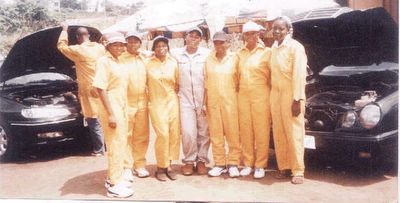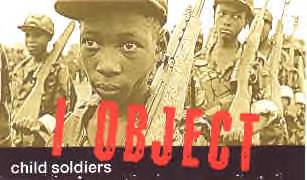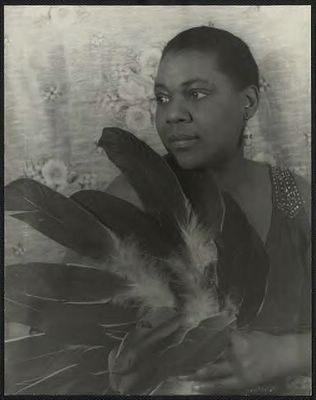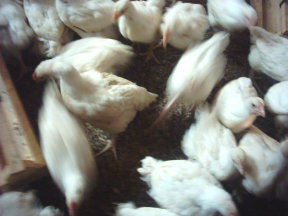
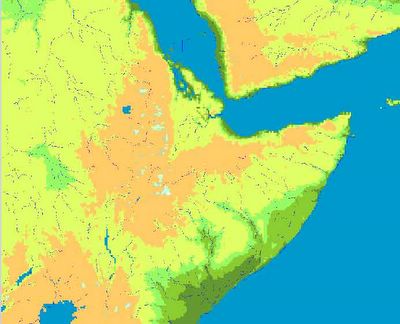
Six Million
The photograph is from Web pages of Alexander S. Brown a GISDE-MA student at Clark University. It shows the Horn of Africa and is part of a series of maps showing a time series analysis of climate and vegetation. His work is quite technical, nevertheless the mapping projects on his Web site are quite stunning to look at and the whole area of study quite interesting. A friend's daughter is a freshman at Clark, so I'm delighted to see such great research being done there. I was also pleased to learn of Department of International Development, Community, and Environment (IDCE) there.
Man oh man! For some reason the editing tools aren't showing up in Blogger today. I've checked my settings and they seem okay, but not having the buttons makes this posting difficult for me; I'm such a clutz! Doing this manually is beyond my expertise.
The reason to show the Horn of Africa is that acording to UN sources:
More than six million people throughout the Horn of Africa region are on the brink of starvation, according to various UN agencies.That sort of news takes a while to sink in. Today I read--I'm not sure where--that perhaps as many as three million are on the verge of starvation in Kenya. That made the news sink in a little. Bill Ainache at Food Crisis in Somalia is an excellent source for information about the crisis.
This morning my Ugandan friend Peter called me and told me that one of the "Lost Boys of Sudan" here in town was murdered early Saturday morning outside a bar in the Uptown neighborhood of Pittsburgh. Peter manages the Africana Magazine and has reported on it there. It's so tragic and Peter wanted to talk about ways to help African immigrants in Pittsburgh adjust to life here.
At Sound Roots dj earball has put up a flyer from The World Can't Wait about protests happening in cities around America on Tuesday before president Bush's State of the Union speech. In Pittsburgh it will be held at 8:00 PM in front of the William Pitt Union. I thought to run that flyer too. And then I considered running a picture of president Bush giving us all an obscene gesture. Oh dear, it's awfully easy to wade into dangerous waters with this blog. It's hard to find the voice to oppose the evils confronting us, especially in a way that doesn't alienate, but rather calls for creating something good.
Bishop Desmond Tutu has found such a voice. I was moved to hear a short speech he delivered at Baltimore's American Visionary Art Museum available at the NPR Web site. Tutu reminds us that human beings are dependant on one another and explains quite succinctly the concept of ubuntu. Keguro at Gukira remarks about how The King James Bible uses "charity" instead of "love" in Paul's famous Epistle to the Corinthians. Keguro writes:
For most of us, love is private and personal. We “fall” in “love.” We “love” our parents. We “love” our countries. And, especially in Protestant teachings, “love” designates an expansive personal relationship. Believers have a “personal” relationship with God, which serves as a template for other relationships.Both Tutu and Keguro point out our obligation--we have no other choice--towards on another.
Charity speaks more immediately to a sense of recurring obligation, freely given, with no expectation of return. There is no unrequited charity. It speaks to a relationship governed by care for others.
Another picture I considered running today was an un-cropped photo of me in that Afro wig. For some reason people have commented that the picture couldn't have been taken here, so just to so it's really me in familiar surroundings. How embarassing that folly! Now whenever I post comments at Blogger blogs that picture shows up.
Most of the links I saved for today are political. I don't think anyone should take me very seriously, after donning an Afro wig in public. But we should take our obligations to others seriously and in one way or another politics enters into that.
So here is a Guardian article about John Perkins, Economic Hitman. And here is an editorial from The New York Times
Spies, Lies and Wiretaps. On February 2nd Not in Our Name's Commission of inquiry into Bush war crimes and crimes against humanity will release preliminary findings at the National Press Club. If all that's too shrill here's a post from The Poor Man Insitute for Freedom, Democracy and a Pony that perhaps will add perspective.
We share this blue jewel of a planet together. So we must find ways of making life for all. Can we be unmoved by the suffering of so many?


